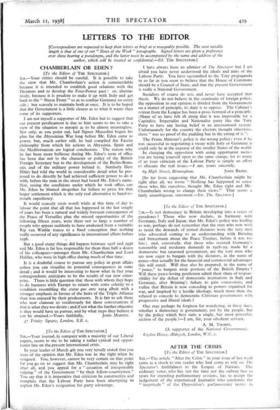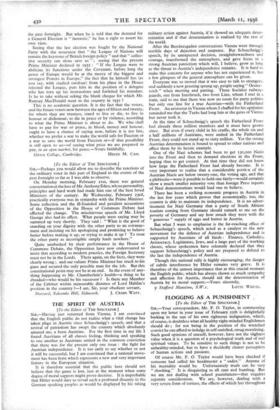AFTER THE CRISIS
[To the Editor of THE SPECTATOR.] Sta,—The article "After the Crisis " in your issue of last week came as a shock to one reader who had come to rely on The Spectator's faithfulness to the League of Nations. The ordinary voter, who has not the time nor the railway fare to spare for attending parliamentary sessions, has to accept the judgement of the experienced journalist who condemns the " ineptitude " of the Opposition's parliamentary tactics in
the past fortnight. But when he is told that the demand for a General Election is " fantastic," he has a right to assert his own view.
Seeing that the last election was fought by the National Party with the assurance that " the League of Nations will remain the keystone of British foreign policy " and that " collec- tive security can alone save us " ; seeing that the present Prime Minister declared in 1935 : " If the League were to abdicate its functions under the Covenant, before long the peace of Europe would be at the mercy of the biggest and strongest Powers in Europe," the fact that he himself has (as you say, with studied candour) from his place in the House rejected the League, puts him in the position of a delegate who has torn up his instructions and forfeited his mandate. Is he to take without asking the blank cheque for which Mr. Ramsay MacDonald went to the country in 1931 ?
This is no academic question. It is the fact that the voters, and the future voters now between the ages of fifteen and twenty, for whom they are trustees, stand to live or die, to live in honour or dishonour, to die in peace or by violence, according to what the Prime Minister is about to do. We who shall have to pay for war or peace, in blood, money and honour, ought to have a chance of saying now, before it is too late, whether we prefer a war to make the world safe for Fascism or
a war to save the world from Fascism or—if that possibility is still open to us—of saying what price we are prepared to pay, in an open market, for peace.—Yours faithfully,











































 Previous page
Previous page